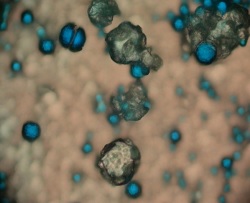 The study of tiny microparticles could be described as the exact opposite of space exploration, scaling from the very small to the very large. But NASA research conducted off-planet for more than a decade could offer drug delivery solutions for the treatment of cancer, and they have the antigravity effects of space to thank for it.
The study of tiny microparticles could be described as the exact opposite of space exploration, scaling from the very small to the very large. But NASA research conducted off-planet for more than a decade could offer drug delivery solutions for the treatment of cancer, and they have the antigravity effects of space to thank for it.
If you've ever seen an astronaut floating in a space station squirting water into the air, then concept is familiar: Liquids tend to form spheres on their own in the absence of gravity. The liquid's surface tension pulls it into the smallest possible area, which is a sphere.
Using this concept on a much smaller level, called microencapsulation, NASA scientists were able to produce "tiny, liquid-filled biodegradable micro-balloons," according to the organization, that contain combinations of cancer drugs. These microcapsules could then be administered to cancer patients.
The Microencapsulation Electrostatic Processing System-II, or MEPS-II, was developed in 2002, but gaps in the research due to funding delayed the health-related studies. NASA interviewed its former investigator, Dennis Morrison, who is currently the R&D director at NuVue Therapeutics and who created the MEPS-II, earlier this month. The International Space Station posted details of the experiments this week.
 |
| Microcapsules (brown) among small oil globules--Courtesy of NuVue |
The process wasn't discovered on terra firma, the scientists say, because of sedimentation due to gravity here. The microgravity environment aboard the International Space Station was ideal for bringing together water and oil in a solution to form the microcapsules.
Making these particles in space all the time is infeasible currently, so the scientists have discovered a way to replicate the process on land.
"We were able to figure out what parameters we needed to control so we could make the same kind of microcapsules on the ground," Morrison said in a statement. "Now, we no longer have to go to space. Space was our teacher, our classroom to figure out how we could make these on earth."
NuVue is now working to gain FDA approval and to eventually bring the microcapsules to manufacturing scale. Morrison and his team are performing studies to deliver cancer drugs to prostate, lung and breast tumors. NASA says approval is a few years away.
Morrison and his research team said: "[T]hese technologies were only able to come to fruition because of the availability of the microgravity environment aboard the space station. Without it, this innovative breakthrough involving the microencapsulation technology process would have never been created."
- here's the NASA report
- and the ISS experiment rundown